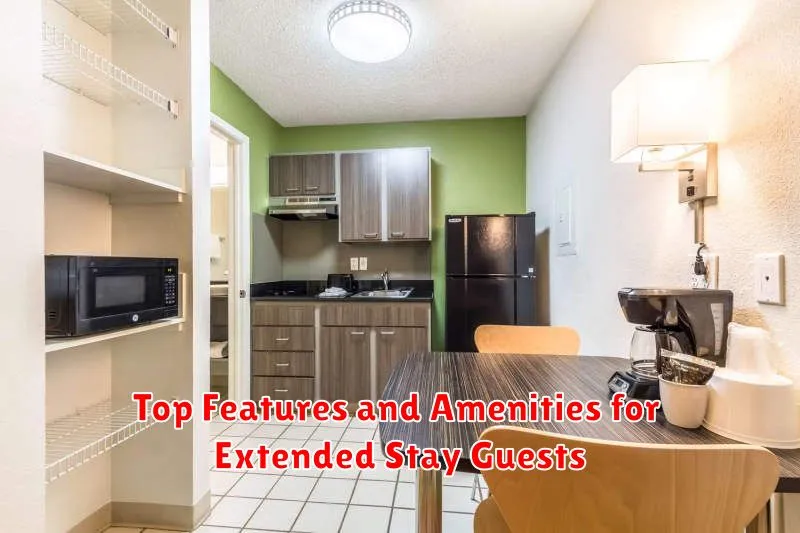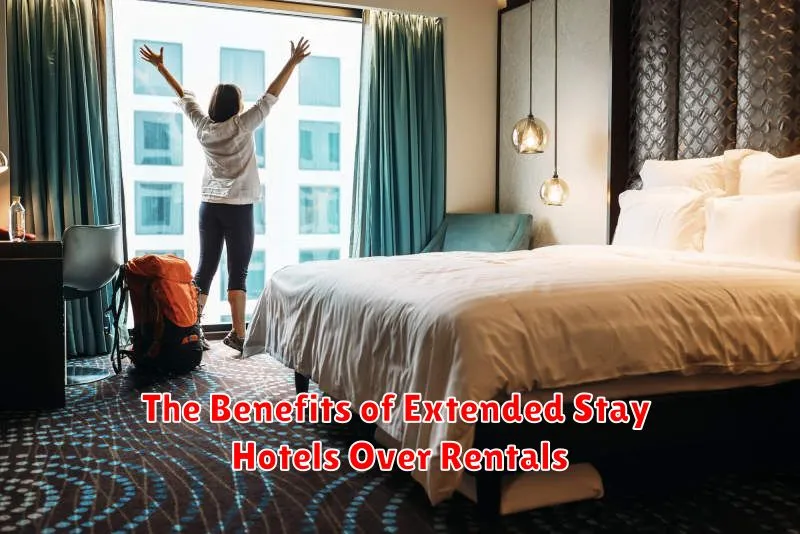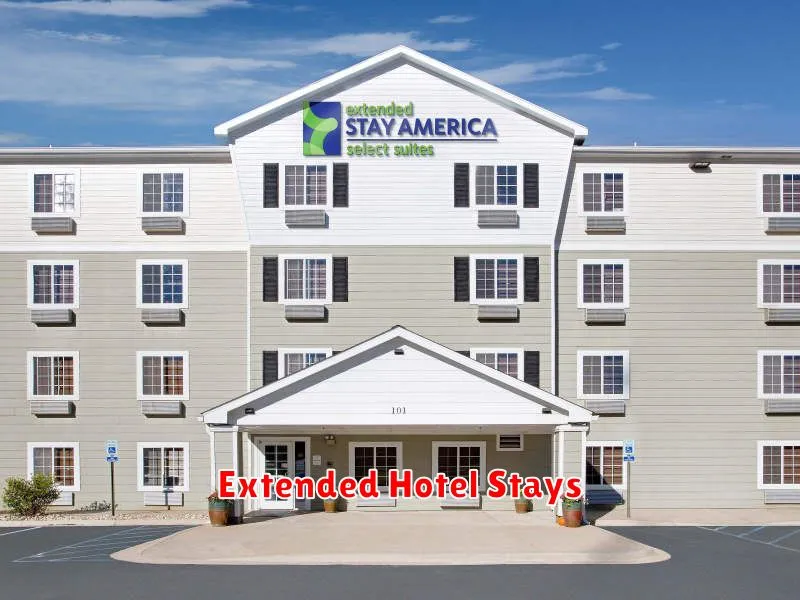Planning an extended stay? Booking a hotel for a longer period requires more than just a quick online search. To avoid potential pitfalls and ensure a comfortable and cost-effective extended hotel stay, you need to know the right questions to ask. This guide reveals 5 essential things you must consider before booking your extended stay hotel, helping you navigate the process and find the perfect temporary home away from home. Whether you’re traveling for business, relocating, or simply enjoying an extended vacation, read on to learn how to maximize your experience and avoid hidden fees!
Why Hotels Are Suitable for Extended Stays
While apartments and vacation rentals might seem like the obvious choice for extended stays, hotels offer several compelling advantages. Convenience is a major factor. Hotels handle all the housekeeping, linen changes, and maintenance, freeing you from chores and allowing you to focus on your trip or work.
Amenities are another significant draw. Many hotels provide fitness centers, pools, business centers, and restaurants, offering a range of services typically unavailable in private rentals. This can significantly enhance your comfort and convenience during your extended stay.
Security is also enhanced in hotels. With 24/7 staff and security measures in place, you’ll generally feel safer than in a private rental, especially if traveling alone. The availability of on-site security and readily available support provides a level of peace of mind.
Furthermore, the flexibility offered by hotels can be advantageous. Many hotels offer different room types to suit varying needs and budgets. Short-term lease agreements also mean you are not locked into a long-term commitment.
Finally, extended-stay hotels often offer discounted rates for longer bookings, making them a financially attractive alternative to other long-term accommodation options. These discounts often offset the daily cost and make them a compelling choice for budget-conscious travelers.
How to Choose the Right Hotel for Long-Term Accommodation
Choosing the right hotel for a long-term stay requires careful consideration beyond just the nightly rate. Location is key; proximity to work, transportation, and amenities significantly impacts your comfort and convenience. Consider the neighborhood’s safety and overall vibe to ensure it aligns with your lifestyle.
Amenities are crucial for extended stays. Look for hotels offering essential services such as laundry facilities (in-unit or on-site), a fitness center, and reliable Wi-Fi. Kitchenettes or fully equipped kitchens can save a substantial amount on food costs. Consider whether the hotel provides parking, if needed.
Pricing for long-term stays often involves negotiating. Don’t hesitate to inquire about monthly or weekly rates; many hotels offer significant discounts for extended bookings. Carefully review the contract terms, including cancellation policies and any hidden fees. Read reviews focusing on long-term guests’ experiences to gain valuable insights.
The hotel’s size and atmosphere play a role in your overall experience. Smaller boutique hotels might offer a more personalized service, while larger chains might provide more amenities. Consider what kind of environment best suits your needs for an extended stay – are you looking for a quiet retreat or a lively social scene?
Finally, before booking, visit the hotel if possible. This allows you to assess the rooms, amenities, and overall ambiance firsthand. If a visit isn’t feasible, thoroughly review high-quality photos and videos, and read recent guest reviews, paying close attention to comments regarding long-term stays.
Top Features and Amenities for Extended Stay Guests

When booking an extended stay, amenities become even more crucial than for a short trip. Look for hotels that offer features designed for longer-term comfort and convenience.
Fully equipped kitchens are a game-changer. Being able to prepare your own meals saves significantly on dining out costs. Consider the size and functionality of the kitchen; a microwave and mini-fridge won’t suffice for longer stays. Look for full-size ovens and refrigerators and ample counter space.
Laundry facilities are another essential. In-room laundry or easily accessible on-site laundry rooms eliminate the need for frequent trips to laundromats, saving you time and money.
Comfortable living spaces are important. Look beyond the bedroom; a comfortable sitting area, adequate storage space (drawers, closets), and a workspace are all vital for a pleasant extended stay. High-speed internet is also non-negotiable for many extended stay guests.
Finally, consider hotel services. Some hotels offer regular housekeeping services for extended stays (frequency may vary), while others provide services like grocery delivery or package acceptance. These conveniences can make a big difference during a longer stay.
How to Negotiate Rates for Extended Hotel Stays
Negotiating rates for extended hotel stays can significantly reduce your overall cost. The key is to be polite but firm, and prepared to walk away if necessary. Start by inquiring about extended-stay discounts. Many hotels offer lower nightly rates for stays of a week or more. Don’t hesitate to ask!
Highlight your loyalty. If you’re a frequent guest of a specific hotel chain or brand, mention this. They may be willing to offer a better rate to retain your business. Membership in loyalty programs can also be advantageous.
Be flexible with your dates. Hotels often have slower periods. Asking about rates for slightly earlier or later dates can sometimes unlock better deals, as they’re more likely to have vacancies.
Compare rates across multiple platforms. Don’t rely solely on the hotel’s website. Check third-party booking sites and compare prices. This gives you leverage when negotiating directly with the hotel, as you can show them a lower rate you’ve found elsewhere.
Don’t be afraid to negotiate. Politely explain your needs and the length of your stay. Suggest a rate you’re comfortable paying and see if they’re willing to meet you halfway. Remember, the worst they can say is no. Be prepared to walk away if the offer isn’t suitable. This shows you’re serious and increases your chances of securing a better deal.
The Benefits of Extended Stay Hotels Over Rentals

When planning an extended stay, choosing between a traditional rental and an extended-stay hotel can be tricky. Extended-stay hotels often offer significant advantages over renting a property, especially for those seeking a hassle-free experience.
One major benefit is convenience. Extended-stay hotels typically include amenities like housekeeping services, which save you valuable time and effort. Furnishings are already in place, eliminating the need for sourcing and moving furniture, and utilities are usually included in the price, simplifying budgeting.
Security and maintenance are also key considerations. Extended-stay hotels provide a level of security often lacking in private rentals, with on-site staff and security measures in place. Furthermore, maintenance and repairs are handled promptly by hotel staff, relieving you of the burden of finding and coordinating with contractors.
Finally, flexibility is another compelling reason to opt for an extended-stay hotel. Lease agreements for rentals often tie you down for a specific duration, while extended-stay hotels offer more flexible booking options, allowing you to adjust your stay as needed. This is particularly beneficial for those whose travel plans are subject to change.
Managing Your Budget for Long-Term Hotel Stays
Extended hotel stays can be surprisingly expensive. To avoid budget blowouts, meticulous planning is key. Before booking, negotiate rates; many hotels offer discounts for longer stays. Don’t forget to factor in hidden costs like parking, Wi-Fi, and potential resort fees. These can significantly add to your overall expense.
Create a detailed budget outlining all anticipated expenses, including daily incidentals. Consider using a budgeting app or spreadsheet to track your spending and ensure you stay within your limits. Remember to account for unexpected costs – emergencies happen, and it’s wise to have a contingency fund.
Explore options to reduce expenses. Opt for a hotel with a kitchenette if possible, allowing you to prepare some meals instead of always eating out. Look for hotels with included amenities like breakfast or gym access, reducing the need for additional spending. Taking advantage of these can save you a considerable amount in the long run.
Compare prices across different hotels and booking platforms. Don’t automatically assume the first deal you find is the best one. Websites specializing in extended stays often offer better deals than general hotel booking sites. Be sure to compare not just the nightly rate but the total cost over your entire stay.
Finally, regularly review your spending. Compare your actual expenditure against your budget and make adjustments as needed. Staying aware of your spending habits throughout your stay will help maintain financial control and prevent unwelcome surprises at the end.
Common Policies for Extended Stay Guests
Extended stay hotels often have different policies than traditional short-term hotels. Understanding these policies beforehand can prevent unexpected costs and frustrations. Key areas to investigate include:
Cleaning and Housekeeping: Unlike daily service in standard hotels, extended stay accommodations usually offer less frequent housekeeping. This might involve weekly cleaning or a schedule you arrange yourself. Be sure to clarify the frequency of cleaning services and any associated charges for extra cleaning.
Rates and Payment: Extended stays typically involve negotiated rates and potentially different payment structures. Confirm the pricing model (e.g., weekly, monthly), payment deadlines, and any applicable discounts for longer stays. Ask about what happens if you need to shorten or lengthen your stay.
Amenities and Services: Extended stay hotels often offer more amenities to cater to long-term guests. These could include kitchenettes or full kitchens, laundry facilities, and potentially complimentary breakfast. Confirm what is included in your rate and what services (like laundry) incur additional costs.
Lease Agreements or Contracts: Some extended stay accommodations operate more like rentals and may involve a formal lease agreement or contract. Read this document carefully before signing, paying attention to cancellation policies, renewal terms, and any rules regarding pets or guests.
Pet Policies: If you are bringing a pet, inquire thoroughly about the hotel’s pet policies, including any additional fees, restrictions on pet size or breed, and designated areas for pet relief.
Conclusion: Making the Most of Long-Term Hotel Accommodation
Securing long-term hotel accommodation can be a rewarding experience, offering flexibility and convenience. However, careful planning is key to maximizing your stay. By understanding the negotiating power you hold, the importance of clarifying terms and conditions, and exploring the potential for amenity discounts and bundled services, you can significantly enhance your comfort and value. Remember to thoroughly research your options and communicate your needs proactively with the hotel. This approach will ensure your extended stay is both enjoyable and cost-effective.
Ultimately, success in long-term hotel stays lies in proactive communication and thorough preparation. Don’t hesitate to ask questions, negotiate rates, and clarify expectations. By doing so, you can transform a temporary stay into a comfortable and fulfilling extended experience.

